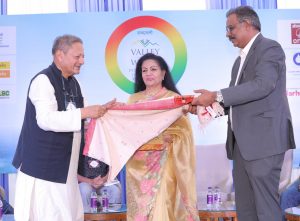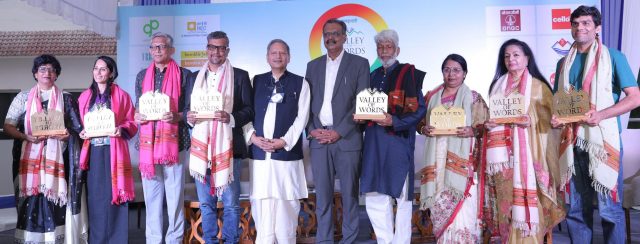By Dr Tania Saili Bakshi & Nikita Aggarwal
Dehradun, 26 Oct: The second and final day of the 9th Edition of the Valley of Words (VoW) Festival unfolded in the Doon Valley with creativity and celebration flowing through every corner. The day’s highlight was the grand finale of the REC VoW Book Awards 2025, which honoured the finest in literature, performance, and thought. The ceremony, moderated by Anoop Nautiyal and joined by REC Executive Director Pradeep Fellows and Festival Director Dr Sanjeev Chopra recognised the winners across multiple categories, alongside Iti Natya winners’ Him Jyoti student-led theatre competition. The glittering evening celebration brought together authors, artists, students, and art lovers from across the country in a moving tribute to the spirit of creativity and collaboration that defines Valley of Words.
Following a soulful opening day of literary exploration, Day 2 offered a seamless continuation, spanning history, sustainability, literature, translation, cinema, and performance, bringing together voices that echoed the rhythm of Dehradun and the intellectual pulse of the nation.

The day began at sunrise with the ITC Musical Soiree Morning, when the serene notes of sitar and tabla floated across the lawns, setting a meditative tone for the conversations to come. With Raag Asavari and Bhairavi greeting the early audience, the morning concert embodied the harmony between tradition and innovation that has long defined VoW.
As the sun climbed higher, the festival’s sessions began in full swing across its three halls and open spaces. On the main stage, the keynote session featured a stirring address on Uttarakhand’s past and future by a revered historian-activist, moderated by Anoop Nautiyal and chaired by N Ravi Shanker. The discussion, supported by the Doon Library & Research Centre and DIT University, reflected on the state’s cultural resilience and environmental challenges, inspiring reflection on how history can guide modern sustainability.
Simultaneously in Words Hall, children and families gathered for the VoW Book Awards 2025: Children’s Literature session, at which the delightful tale Cactus Wants a Hug captured hearts. The conversation, moderated by Pooja Marwah, reminded everyone that empathy and friendship are universal needs. Supported by the Montessori School, Him Jyoti School, and students of Raphael Ryder Cheshire International Centre, who set an uplifting tone performing a Zumba for the day’s literary discussions.
A short while later, Shabdavali Hall hosted ‘India-Korea: From Humanitarian Assistance to Strategic Partnership’, chaired by Col Ajay Kothiyal with panellists Brigadier Tapan Pant and Prof Wongi Choe, and moderated by Col Dr DPK Pillay. The conversation traced the evolving relationship between India and South Korea—from peacekeeping collaborations to cultural exchange—underscoring the festival’s spirit of international dialogue.
As the morning progressed, literature took the front seat again. On the main stage, ‘Ananda: An Exploration of Cannabis in India’, authored by Karan Madhok and moderated by Yauvanika Chopra, delved into the paradoxical identity of cannabis in Indian culture, sacred, banned, and rediscovered. Meanwhile, Words Hall saw Suno Kabir by Soni Pandey come alive under the guidance of moderator LS Bajpai, weaving narratives of community, gender, and faith in Hindi fiction. Both sessions drew impressive audiences, reaffirming VoW’s dedication to bridging English and Hindi literary excellence.
Shabdavali featured Anil Raturi, Amit Srivastav, and Kripa Ram Nautiyal in conversation with Anjum Sharma, engaging attendees with reflections on regional storytelling, from police memoirs and generational sagas to narratives of the Jaunsari community. The discussion celebrated the evolving literary voices emerging from Uttarakhand’s valleys and towns.
As the clock struck noon, the main stage shifted to translation with the session on Lavanyadevi, presented by Banibrata Mahanta and moderated by Nalanda Pandey. This translation was of Kusum Khemani’s acclaimed Hindi novel. At the same time, the neighbouring venue hosted Individuals, Institutions, Ideas, chaired by Shishir Priyadarshi (CRF), with insights from Abhinav Kumar (BSF) and Sanjeev Chopra (LBSNAA). The panel reflected on the legacy of Lal Bahadur Shastri and his enduring institutional impact, blending governance, ethics, and leadership.
In Shabdavali Hall, philately enthusiasts gathered for a workshop led by Abhai Mishra on Uttarakhand: A Philatelic Journey, offering a glimpse into postal histories from the Himalayas to Antarctica. Supported by Him Jyoti and Montessori School, the workshop blended nostalgia and education, showing how stamps preserve stories of national memory.
Post-lunch sessions continued the intellectual momentum with FLO: Women Building the Nation, moderated by Charu Chauhan, featuring voices that represented entrepreneurship, education, and empowerment under the FICCI Ladies Organisation. Simultaneously, Words Hall presented Authors from the Valley, moderated by Deepanjali Singh, bringing together Bijoya Sawian, Ratna Manucha, Neena Nehru, and Kulbhushan Kain, writers whose work breathe life into Dehradun’s culture and lore.
At the same time, the spotlight in Shabdavali Hall turned to regional cinema with ‘Action! Script! Direction! Garhwali Cinema Today’, chaired by Satish Sharma with Balraj Negi, Rashmi Nautiyal, Rishabh Kumar, and Siddharth Sharma. The conversation explored the challenges and promise of the local film industry, identifying pathways for Uttarakhand’s stories to reach wider screens.
The afternoon also brought youthful energy to the lawns through ITI Natya: Folktales from the Hills, staged by Him Jyoti School and emceed by Harshit Gupta. This theatrical presentation on biodiversity and ecology, part of VoW’s ongoing collaboration with the Young Indians, transformed folklore into an environmental message for modern times.
Inside the halls, the session, Changing Face of Media, featuring Kavita Upadhyay, Rahul Kotiyal, and Rajat Shakti, moderated by Harsh Dobhal, offered a candid look at evolving journalism in Uttarakhand. Parallelly, Dev Bhoomi Mein Mahabharat, moderated by Navneet Gairola with Lokesh Ohri, Ashish Bhandari, and Neha Mittal, discussed how Uttarakhand’s villages and traditions remain interwoven with the epic’s living mythology, from Pandu-Pratha customs to the symbolic dance Chakravyuh.
By mid-afternoon, sustainability took centre stage once again through the RS Tolia Forum for Sustainability: Think Local, Think Global, Mountain Cities of the Future, featuring Rajendra Dobhal, Harish Bahuguna, Rahul Kotiyal, and Kshama Gupta, moderated by Anoop Nautiyal. The dialogue explored how mountain cities can balance development with ecology, echoing VoW’s broader environmental commitment.
In the same hour, two parallel discussions added cultural depth. In Words Hall, Sushil Upadhyay moderated the VBA Hindi Translation session on Bahattar Meel by Sulabha Kore, a translation of Ashok Watkar’s Marathi work depicting the harsh realities of Dalit life and social inequality. In Shabdavali Hall, the session Uttarakhand Mein Rajyabhasha Sanskrit, chaired by Indu Pande and moderated by Bharti Mishra with Deepak Gairola and Sudha Rani Pandey, discussed policy, pedagogy, and the living future of Sanskrit as a state language.
As the evening deepened, the festival turned its gaze toward empathy and social change. The panel, The Last Beggar: From Donation to Dignity, moderated by Anoop Nautiyal and featuring Chandra Mishra, Aditi P Kaur, Abhinav Shah, and Samarth Khanna, examined ways citizens can empower those on society’s margins. Nearby, environmentalist Ravi Chopra and SS Rawat discussed the session Jal, moderated by Anjali Bhartari, questioning how Dehradun might rediscover its identity as a city of rivers and springs.
At the same time, literary introspection continued with Why Stories Matter, featuring Mona Verma, Bijoya Sawian, and Sonika Sethi, who reflected on how narratives shape identity and collective memory. Each speaker invited the audience to reconsider the stories that define their sense of self and community.
As music returned to the open air, the festival’s deck area echoed with melodies performed by emerging artists, reminding everyone that VoW’s soul lies not just in words but in the arts that connect them. The performances bridged generations and genres, blending folk rhythms with contemporary expression against the backdrop of the Himalayas.
By the time the lights dimmed and conversations drifted into the cool evening air, the ninth edition of Valley of Words had reaffirmed its essence: a space where ideas breathe freely, traditions converse with modernity, and every participant leaves a little richer in thought and imagination. Over two days, the festival brought together more than a hundred speakers, dozens of institutions, and thousands of visitors, each drawn by the same commitment to dialogue and discovery.
Valley of Words 2025 ended on a note of gratitude and grace, its final moments echoing with the applause of audiences who had journeyed through a kaleidoscope of art and ideas. As the Doon Valley settled into silence, the festival left behind an invisible trail of stories, melodies, and memories, a reminder that words, when spoken with truth and passion, can still move mountains.







